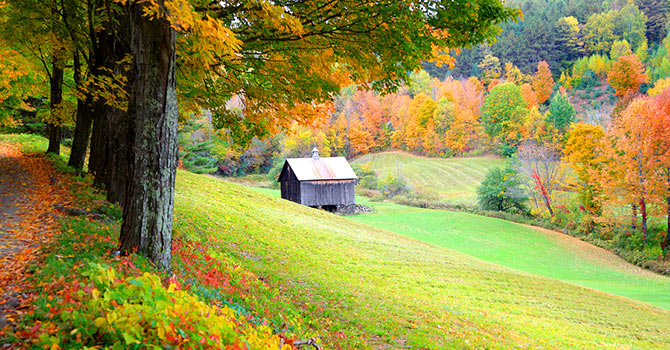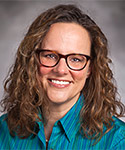Last year, on a vacation in Vermont, my partner, Dave, and I were delighted to discover that our smartphones did not work atop the mountains, in the valleys or along the byways of the verdant countryside. We picked up a couple of maps -- those impossible-to-fold, colorful paper ones -- and were on our way.
And we were lost.
Not lost in the sense of not knowing where we were. In fact, we understood the landscape in a sense far deeper than what is afforded by a little 2-by-4-inch screen on which the navigator is always, stubbornly, at the center.
A real map has a way of decentering us, locating our vulnerability and urging us to depend on livelier landmarks to find our way. Engaging a landscape in this way was something I had forgotten, and it was a delight to try to chart our path by streams and crossroads.
We lost ourselves in those maps and in those hills. The kind of lost in which the itinerary is tossed aside for the time being, in which you choose the most interesting way to get to a destination rather than the most direct. The kind of lost in which hours slip by and you only know it’s getting late because the sun is low and bright.
Time and the landscape are spacious; they invite wandering minds and hearts.
This wandering felt a little bit like when I first began to study theology and education. Hours passed while I immersed myself in the labyrinthine prose of Friedrich Schleiermacher, Rosemary Radford Ruether and Paulo Freire. I would get lost in those texts, as if solving a puzzle. The language was complicated, and I’d have to read some parts two or three times to decipher their meaning.
But the time spent wandering seemed worth it, like it mattered, because it told me something about myself, my relationship to God, and the work of justice and love in the world. My time in seminary and in my doctoral program convinced me that a life spent lost in words -- and trying to live them out in the world with love and conviction -- would be my calling, as a theological educator.
It seemed to me to be a good way to use my “one wild and precious life,” as the poet Mary Oliver once put it.
Each August, before classes begin for the year, our faculty holds a two-day conference. During this time, we take up themes that require more thought and imagination than our monthly faculty meetings afford.
The year I arrived, the faculty wondered how, in the midst of competing commitments, our students could develop a “rule of life.” Many of them are parenting, working and serving in their local communities. They are artists, writers and teachers.
Theological education should help them learn to balance these commitments with the deep practice and reflection that make up theological education. It should help them craft lives of meaning and purpose, with time to pray, read, exercise, write, build community, eat, play and serve.
But what if we, their teachers, are also in need of a rule of life? How can I, as a theological educator, speak with integrity to my students about protecting time for prayer, for play and for reading when I struggle to protect that time for myself?
I didn’t expect when I began this career that I would spend so much time staring at a computer screen, for example. Students, administrators, colleagues, church leaders, strangers with theological questions, organizations and academic societies fill my email inbox with urgent notices, reminders and suggestions. Many days pass in which this little box on my desk (or in my lap or in my hand) determines the course of my entire day. I seem to live my life in a continual state of reaction.
What kind of a rule of life is that?
And it is not solely a matter of how these screens consume my focus and my time. If it were, I could just take a course in time management and set my life in order -- time blocked out for prayer, for eating, for loving, for studying, for working.
But these are technical responses to a deeper, more substantive question: What kind of time is needed to cultivate an abundant life? What kind of time is needed to learn?
The kind of learning that nurtures life abundant requires a degree of wandering, of getting lost. And if I am unable to do this as a seminary professor, how can I expect the religious leaders I am educating to do it?
Environmental education scholar David Orr argues that technological advances have changed how we understand learning and how we think knowledge is acquired and put to use.
Our culture of “fast knowledge,” he warns, assumes that progress depends on rapidity of knowledge generation, acquisition and implementation. But this pursuit is quite different from the slow and incremental process that nurtures the cultivation of wisdom.
And isn’t wisdom what we hope is nurtured in theological education? That’s the goal of what Orr has termed “slow knowledge.”
In his essay “Slow Knowledge,” Orr writes that “for all of the hype about the information age and the speed at which humans are purported to learn, the facts say that our collective learning rate is about what it has always been: rather slow.”
Wandering and getting lost, and protecting the time to do that, are necessary ingredients in the process of cultivating slow knowledge. It is in that space of wandering (wondering?) that creativity and wisdom are nurtured.
In theological and higher education, the demands of the present, of proliferating institutional labor and of ceaseless communication make wandering time increasingly difficult to find and protect. But that time is absolutely essential for our work.
Wandering and getting lost is crucial to the practice of ministry. And it must be honored in our seminary classrooms, the places where religious leaders are formed.
I haven’t fully worked out how to do this just yet. It is, to a degree, countercultural. To honor wandering is to reject the idealization of busyness, to resist the demand for deliverables and to reorganize my days so that getting lost is the first and most intentional thing I do. For now, I’ll just keep getting out the map.














